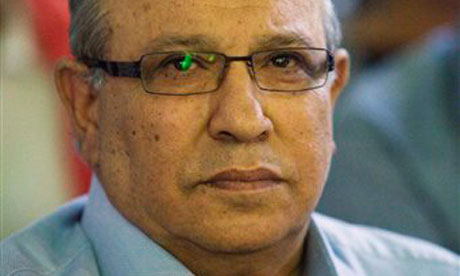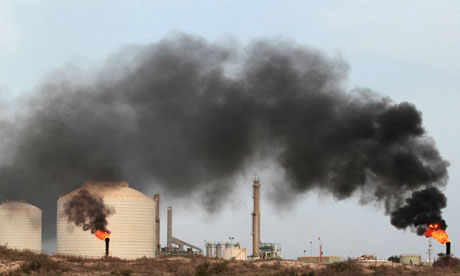Israelis don't need to be paranoid about Iran's nuclear installations. Iran's leaders have other concerns on their minds
By Meir Javedanfar

By Meir Javedanfar

Meir Dagan has been asked to return his diplomatic passport after saying he thinks attacking Iran would be 'a stupid idea'. Photograph: Dan Balilty/AP
Israel's former intelligence chief, Meir Dagan, has been subjected to a firestorm of criticism – from the Israeli government as well as sections of the media – since he stated that attacking Iran's nuclear installations would be "a stupid idea".
So strong has been the reaction that the prime minister's office even asked him to return his diplomatic passport.
What seems to be bothering some Israelis, including Ari Shavit, the respected Haaretz journalist, is that Dagan has now "made the Iranians think they can continue galloping to the bomb because they are not in any real danger".
This claim, though, is a clear example of where some in Israel are getting it wrong with regard to Iran and what the Iranian leadership perceives as serious threats.
Israel has to realise that the Tehran regime is more petrified by what is happening to its economy and among its own population than by the possibility of a military attack from Israel. When it comes to using violence, this regime has had 32 years of experience. It can cope.
However, the regime is so frightened of its own population that it breaks up silent demonstrations. It panicked when the shooting of Neda Agha Soltan was filmed and broadcast to the world. It even went as far as to temporarily ban books by Paulo Coelho – simply because his editor in Iran, Arash Hejazi, was seen trying to save Neda's life.
Dagan could be wrong in his assessment but, even if he is right, it does not mean that cessation of a military threat from Israel would induce the Iranian government to "gallop ahead" towards the bomb without any concern.
The biggest reason why Iran's supreme leader, Ali Khamenei, has agreed to talks during the last few years is not the fear of a military attack by Israel. The biggest reason is that he is worried about his country's economy, which is far more crucial to the regime's survival than the nuclear programme. The Islamic regime in Iran has not and will not live on its nuclear programme. It lives on its economy.
Khamenei is worried that if he doesn't negotiate, the west will find it easier to justify isolating his country. This, in turn, will make it easier to gain international approval for tough economic sanctions.
With so much legitimacy lost domestically after Mahmoud Ahmadinejad's controversial election in 2009, Khamenei has even more reason to worry about the impact that sanctions could have on the survival of his regime. This is the main reason why he is negotiating and will continue to do so. This is also why he will be careful, as he was before Dagan's statement, in the way he approaches his nuclear programme.
One also has to ask: which is the bigger reason why the international community is becoming more united against Iran's nuclear programme? Its distaste and concern for Khamanei's desire to have access to a bomb (which is becoming more apparent from clause 35 of the most recent IAEA report), or threats by Israel to attack Iran's nuclear installations? After recent revelations, such as the secret enrichment site near Qom, the former is more true.
To deal with such a regime and to confront its controversial nuclear programme, instead of constantly relying on military threats, Israel's leaders would be better advised to study Coelho's masterpiece, The Alchemist, and page 121 in particular:
"When you want something, all the universe conspires in helping you to achieve it."
Israel is no longer alone in its belief that Iran wants to build a bomb. Judging by the support for sanctions, the UN and especially its security council members are more on the side of Israel than Iran. This includes countries such as South Korea that have adopted unilateral sanctions against Iran.
In its bid to stop Iran's nuclear programme Israel should help itself and the international community. The most potent way would be by improving relations with the Islamic world, especially the PLO and Turkey. Israel had good relations with them before. It can do so again.
Fortunately for Israel, and unfortunately for Khamenei, Israel even has the option to hurt the regime on its very own streets.
That option is the cessation of verbal military threats against Iran. Cessation of military threats from Israel will make it much harder for the regime to divert the public's attention away from its falling popularity and serious domestic problems. Silence from Israel will make Iran's leaders more worried, as it will rob Khamenei from an important tool which has helped him, and at a crucial time when the regime is hemorrhaging legitimacy and popularity at an unprecedented rate. The damage such an endeavour will cause is worth the inconvenience of Israeli politicians having to bite their tongues.
Cessation of verbal threats will also prevent significant future damage being caused to Israel's deterrence posture if, at the end of the day, it decides to not to attack Iran's nuclear installations.
Coelho once said:
"Be careful. You can hurt with your words, but you can also hurt with your silence."
The words of a wise man.
-This commentary was published in The Guardian on 25/06/2011
-Meir Javedanfar is an Iranian-Israeli Middle East analyst and co-author of The Nuclear Sphinx of Tehran: Mahmoud Ahmadinejad and the State of Iran
-Meir Javedanfar is an Iranian-Israeli Middle East analyst and co-author of The Nuclear Sphinx of Tehran: Mahmoud Ahmadinejad and the State of Iran


